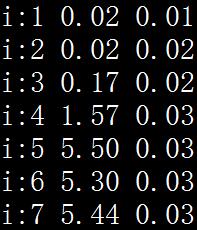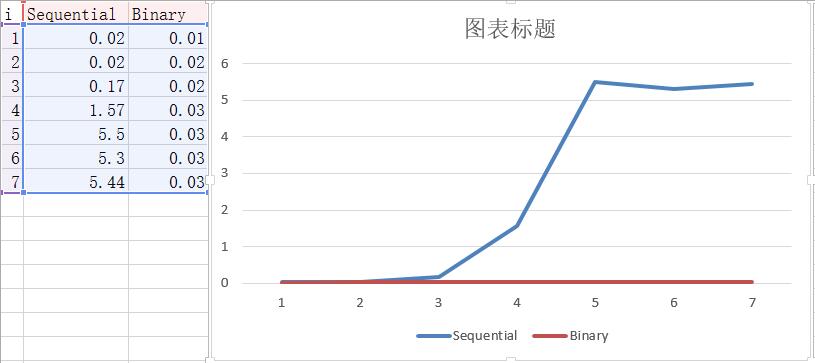DSAA Homework 2
2016-09-20 23:26
573 查看
Exercises
3.4
a
by the definition3∗2n′=64∗3∗2n
2n′=2n+6
n’=n+6
c
by the definition8n′=64∗8n
n′=64n
3.8
c
For the all values of n >1e9ed
1, c4nlogn+c5n≤c4nlogn+c5nlogn≤(c4+c5)nlogn. Therefore, by the definition, T(n) is in O(n) for n0=1 and c=c4+c5
For all n > 1, c4nlogn+c5n≥c4n+c5n≥(c4+c5)n. Therefore, by the definition, T(n) is in Ω(n) for n0=1 and c=c4+c5.
d
For the all values of n > 29, c62n+c7n6≤(c6+c7)2n. Therefore, by the definition, T(n) is in O(n) for n0=29 and c=c4+c5.For the all values of n > 29, c62n+c7n6≥(c6+c7)n6. Therefore, by the definition, T(n) is in Ω(n) for n0=29 and c=c4+c5.
3.11
b
limn→∞n√logn2=limn→∞n√4=∞ , so f(n) is in Ω(g(n))e
limn→∞nlogn+nlogn=limn→∞n=∞ , so f(n) is in Ω(g(n))h
limn→∞2n10n2=∞ , so f(n) is in Ω(g(n))3.12
a
Θ(1)b
Θ(n)c
Θ(n2)d
Θ(n2)e
Θ(nlogn)f
Θ(nlogn)g
Θ(n2logn)Projects
3.2
#include<cstdio>
#include<cstdlib>
#include<ctime>
const int maxn = 1e7 + 100;
int a[maxn];
int random(int n){
return rand() % n;
}
int SeSearch(int val, int n){
for(int i = 0; i < n; i++)
if(a[i] == val) return i;
return -1;
}
int BiSearch(int val, int n){
int l = 0, r = n;
while(r - l > 1){
int m = (l + r) / 2;
if(a[m] > val) r = m;
else l = m;
}
return a[l] == val ? l : -1;
}
int main(){
for(int i = 0; i < maxn; i++) a[i] = i;
const int T = 100000;
int tmp;
clock_t begin, end;
for(int n = 10, k = 1; k <= 7; n *= 10, k++){
printf("i:%d ", k);
begin = clock();
for(int i = 0; i < T; i++)
tmp = SeSearch(random(n), n);
end = clock();
printf("%.2lf ", (double)(end - begin) / CLOCKS_PER_SEC);
begin = clock();
for(int i = 0; i < T; i++)
tmp = BiSearch(random(n), n);
end = clock();
printf("%.2lf\n", (double)(end - begin) / CLOCKS_PER_SEC);
}
return 0;
}
| i | Sequential | Binary |
|---|---|---|
| 1 | 0.02 | 0.01 |
| 2 | 0.02 | 0.02 |
| 3 | 0.17 | 0.02 |
| 4 | 1.57 | 0.03 |
| 5 | 5.50 | 0.03 |
| 6 | 5.30 | 0.03 |
| 7 | 5.44 | 0.03 |

So binary search always faster than sequential search.
相关文章推荐
- LeetCode53. Maximum Subarray 动态规划和分治法
- 工具使用:git
- php curl 的使用
- 1117—3.3v稳压芯片
- Service
- POJ2560 Freckles
- 【转载】ODBC, OLEDB, ADO, ADO.Net的演化简史
- 左移右移的思考
- Codeforces-492B-Vanya and Lanterns
- 适配iOS10以及Xcode8-b
- How to install Oh My Zsh on Ubuntu 14
- 嵌入式培训第二阶段 第一星期 no.1 标准 I / O
- cancel事件
- JNA释放Memory对象分配的内存
- HDU 5898 odd-even number 数位DP
- CF687A. NP-Hard Problem[二分图判定]
- rails 路由
- Codeforces-368B-Sereja and Suffixes
- 源码角度讲解子线程创建Handler报错的原因
- 0062 玻璃珠从楼层上丢下找破碎临界楼层(腾讯笔试题)
